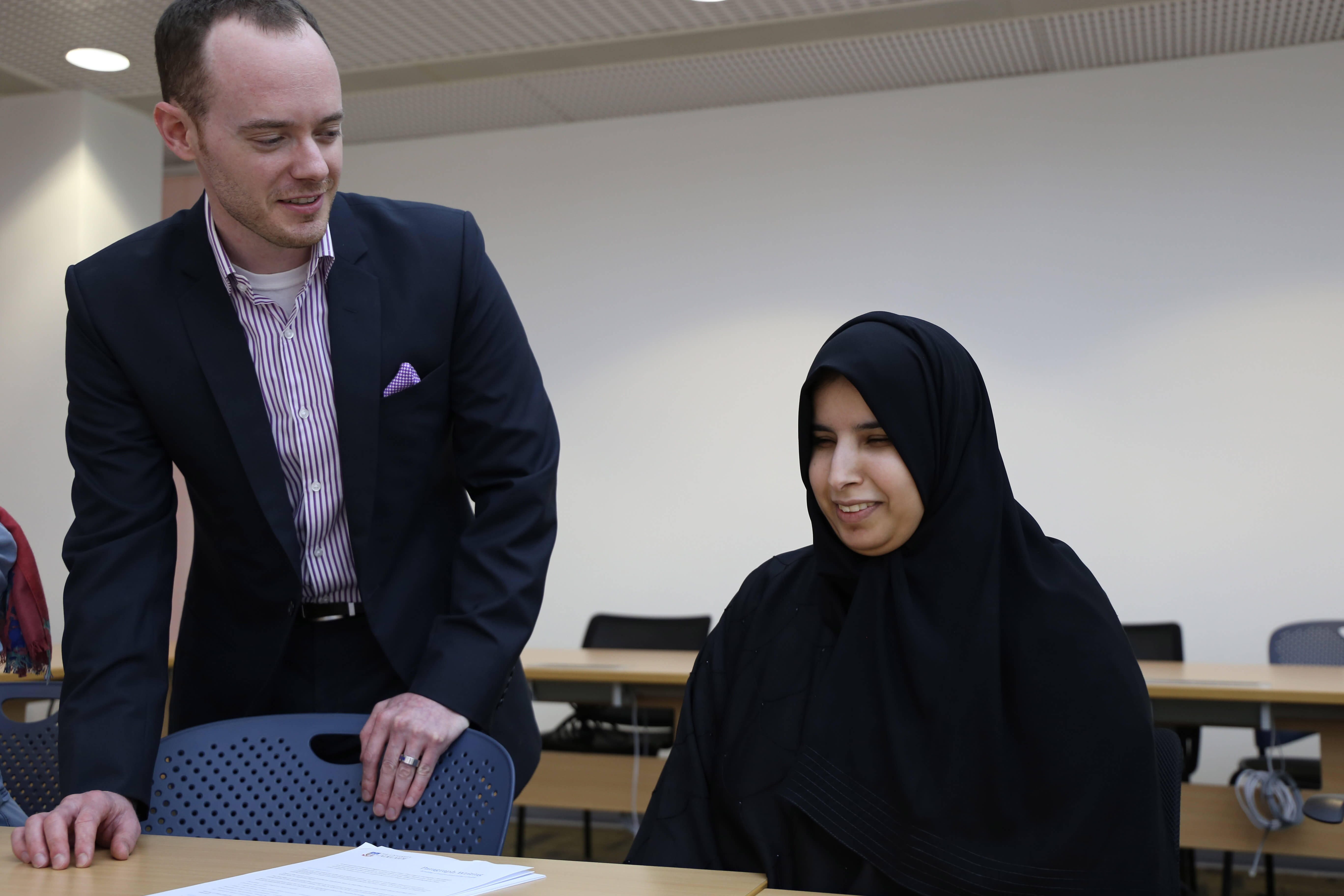
As Qatar’s education landscape continues to develop, it becomes crucial to create and sustain an academic environment that is both equitable and inclusive by making universities accessible to people with disabilities. Hamad Bin Khalifa University (HBKU), a member of Qatar Foundation for Education, Science and Community Development (QF), is one university that seeks to not only provide students with a welcoming and supportive environment, but also the administrative and logistical help to aid those with disabilities who are interested in their programs.
Kholoud Abu-Sharida, had a passion for languages and was encouraged by a friend to apply to HBKU’s program in translation studies, offered through the university’s Translation and Interpreting Institute (TII). Mentioning her concern during the application process, she said, “I often don’t know if people are going to accept me with my disability or not. Sometimes they have concerns about finding resources, but I thank God for the Translation and Interpreting Institute - they accepted me, welcomed me, and have been willing to adjust to meet my needs.”
Visually impaired since birth, Abu-Sharida completed much of her schooling abroad. She notes that four of the eleven children in her family are blind, but that her mother and late father have always been supportive of their development. “My mom never tells me what to do, but allows me the freedom to decide for myself. People used to wonder why she would send a blind child to school, but she stood up against society to support our education. I could never repay her for this unconditional support. My blind older sister also encourages me. She says whatever dreams she has, she’s happy if I’m the one able to achieve them.”
After pursuing an undergraduate degree in English and mass communications, Abu-Sharida began to work as a script-writer at Al Jazeera Children’s Channel in 2013. Eager to continue her studies, she was drawn to the program at TII in order to challenge herself and in the hope of being an inspiration, not only to her siblings, but also others who are blind. “For a person like me who has a disability, people may doubt what we can do. I wanted to do something exceptional to make people believe in me and also help me to believe in myself. I love a challenge and want to tell people, I can do what you can do. I can’t claim to be supernatural, but although I have my disability I’m essentially an ordinary person just like everyone else.”
Passionate about putting translation theory into practice, Abu-Sharida often offers insight to TII on its audio-descriptive translation projects for audiences with specific needs, where translators audio describe films, create descriptive guides for museums, or develop tactile materials to interpret visual content. Dr. Josélia Neves, an associate professor at the university with the responsibility of promoting accessible learning initiatives within TII, mentions, “Not being able to see allows Kholoud to be a better ‘listener’ and her questions about visual information helps those who see to attribute meaning to what may otherwise go unnoticed.”
An ambitious student, Abu-Sharida is already working on an animated film for her final dissertation at TII. She will write the script, have the cartoon developed and the audio recorded, translate it, and write a commentary on the methods she used. Speaking about the project, she says, “I named it ‘The Blind Princess’. I’m inspired by the question ‘Why do princesses always look perfect? Why can’t someone who has a disability or who is blind see themselves as a princess?’ The message I want to get across is that beauty is in the heart, not in the face.” Though she notes that both young and old may enjoy and benefit from watching the film, her main target is children in Qatar, hoping to inform them about those with disabilities, break down barriers in society, and combat harmful stereotypes.
Though Abu-Sharida is quick to express a deep appreciation towards TII professors for their cooperation and assistance both in and out of class, Dr. Nicholas Goodbody, one of Kholoud’s professors at TII, noted, “Kholoud was accepted onto the MA in Translation Studies program because of her academic record and her strong interest in translation. In class, we give her the same opportunities to develop her knowledge as we do to everyone else. We of course make accommodations for her specific needs, but they are in no way a barrier to her getting the most out of the program – it simply gives her a unique perspective on translation.”
Dr. Neves added, “Kholoud is a true asset to us. Having a student with vision impairment within the student body has allowed us teachers to rethink our teaching strategies and learning materials. Kholoud makes us question whether our materials are clear, whether they are accessible to screen readers, and whether our visuals are relevant.”
She continued, “Rather than TII offering special solutions for Kholoud, Kholoud has really given TII the opportunity to think over its teaching and learning approaches, making access easier for all students.”
Committed to helping its students unlock their potential, HBKU is currently accepting applications for its fall 2016 intake across a wide range of programs. The university will host a Graduate Open House this Saturday, November 14th at the HBKU Student Center from 5pm to 7pm, offering prospective students the opportunity to learn more about HBKU degrees and meet faculty members. Those interested may RSVP online at ` http://www.hbku.edu.qa/openhouse .





